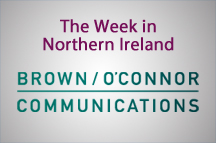 This week, after 284 days without an Executive, the Secretary of State for Northern Ireland, James Brokenshire outlined a new talks ‘deadline’ of the 6th November to establish an Executive. In case our elected representatives didn’t get the message, he also set a pre-deadline deadline of 30th October. If no positive signs of a deal are evident by that date, the Secretary of State must begin a legislation process in the House of Commons. Speaking to the NI Affairs Select Committee, he said whilst this did not denote direct rule, it seems that NI is ‘on a glide path’ to increasing intervention by Westminster.
This week, after 284 days without an Executive, the Secretary of State for Northern Ireland, James Brokenshire outlined a new talks ‘deadline’ of the 6th November to establish an Executive. In case our elected representatives didn’t get the message, he also set a pre-deadline deadline of 30th October. If no positive signs of a deal are evident by that date, the Secretary of State must begin a legislation process in the House of Commons. Speaking to the NI Affairs Select Committee, he said whilst this did not denote direct rule, it seems that NI is ‘on a glide path’ to increasing intervention by Westminster.
Last week, there was a palpable sense of optimism as it seemed as though a bit of momentum was building around the talks and positive noises were being heard from both camps. That dissipated over the weekend, however, with the DUP saying that talk of an imminent deal had no basis in fact. The Irish Times also reported this week that Michelle O’Neill had been ready to do a deal but was overruled by others within the party. Ms O’Neill has said that no deal was presented to her party.
A further attempt to get things moving again came in the form of a flying visit by former US President Bill Clinton, who visited both the Sinn Fein and DUP leaders on Tuesday. Mr Clinton is reported to have told Arlene Foster that he is reluctant to refer to her as the ‘former First Minister’ because he believes that a deal can still be done.
 The latest talks process has been a dreadfully long slog and it is becoming increasingly apparent that a lack of political leadership in the form of an Executive is more than taking its toll. It took NI civil servants until 11pm on Sunday evening to announce that schools would be closed in light of the dangers posed by Hurricane Ophelia. A report revealed that NI is among the worst performing healthcare systems in the UK, failing to meet important targets. We are on a collision course with Brexit, unsure of what the border will look like, despite being most at risk if a poor deal is struck between Theresa May and her European counterparts.
The latest talks process has been a dreadfully long slog and it is becoming increasingly apparent that a lack of political leadership in the form of an Executive is more than taking its toll. It took NI civil servants until 11pm on Sunday evening to announce that schools would be closed in light of the dangers posed by Hurricane Ophelia. A report revealed that NI is among the worst performing healthcare systems in the UK, failing to meet important targets. We are on a collision course with Brexit, unsure of what the border will look like, despite being most at risk if a poor deal is struck between Theresa May and her European counterparts.
Even if a Stormont deal is done by November, a question we must ask ourselves as a society is whether or not irreparable damage has been done to our peace process and the institutions at Stormont over the past nine months.
The story of Catholic residents being forced from their homes in a shared housing scheme in Belfast made it into The New York Times. We had the revelation this week of Caitriona Ruane continuing to receive her £55k Principal Deputy Speaker salary despite no longer being an MLA.
Public confidence in the system is now hugely damaged.
Without political leaders working together at Stormont, what example is there for younger generations to work together, get on and continue to forge a future that creates a safe and welcoming space for everyone? Deal or no deal, we face a long road ahead and have many bridges to rebuild.














